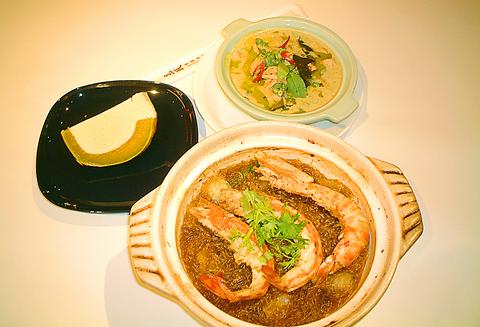One of Taipei's long-serving Thai restaurant chains, Thai Town Cuisine -- which until earlier this year went by the name Very Thai -- has been cooking up some of the tastiest and spiciest Siamese meals in the city for over six years.
Unlike the bad luck that is likely to ensure following the changing of a ship's name, the name-change and interior face-lift that saw the chain's Nanjing East Road store reopening under its new moniker earlier this year, have neither dented its reputation nor seen the restaurant flounder in anyway.

PHOTO: GAVIN PHIPPS, TAIPEI TIMES
In fact, since reopening for business in April, Thai Town Cuisine, with its new slick black-and-red interior, has experienced quite the opposite after-effect. Patronage has continued to increase and looks set to continue to do so for the unforeseeable future.
The secret of its success, according to marketing supervisor Jean Lin (林宜靜), lays not only with the quality of the food served at Thai Town Cuisine, but is also heavily influenced by management's tenacity for consistency. Whether you choose to chow down at the chain's Tienmou branch or its Yongho branch, the food that will arrive at your table will be equally scrumptious, regardless of the social environment of the neighborhood you opt to dine in. "It's often difficult when you run a chain store to maintain a constant level of quality," explained Lin. "With one restaurant, it's easy to keep a good reputation, but, more often than not, when restaurants expand it all goes downhill." To ensure Thai Town Cuisine doesn't join the long list of establishments that have branched out, but failed to keep them coming back for more, management keeps an eye on its kitchens and what takes place within them. Much of what appears on the menu certainly won't come as a surprise to lovers of traditional Siamese fare. The uniform quality of the product, however, is worth noting. The menu is packed with all the standard Thai dishes such as curry crab (NT$450), sweet and sour cod Thai-style (NT$300), king pawn vermicelli (NT$450), spicy beef and cashew nuts (NT280) and coconut beef curry (NT$280) to name but a few. Along with the usual suspects, Thai Town does throw a few original dishes in the diner's direction. Finding dishes such as the red curry with vegetables and fruit (NT$180), deep-fried sea bass with tamarind and chili (NT$450), spicy octopus with cashew nuts (NT$300) and roasted pork with lemon sauce (NT$280) on the menu makes for a pleasant and certainly tasty change. The thing that really sets Thai Town Cuisine apart from its many peers, however, is the manner in which the chefs ensure each dish fires a chili-loaded salvo. Whatever you choose to dine on, it's guaranteed that it will contain a whole heap of chili and garlic. As well as Thai Town Cuisine's Yongho, Nanjing East Road and Tienmou branches, fans of Thai food who call Panchiao and Sanchung home can also experience the chain's appetizing Thai food.

Three big changes have transformed the landscape of Taiwan’s local patronage factions: Increasing Democratic Progressive Party (DPP) involvement, rising new factions and the Chinese Nationalist Party’s (KMT) significantly weakened control. GREEN FACTIONS It is said that “south of the Zhuoshui River (濁水溪), there is no blue-green divide,” meaning that from Yunlin County south there is no difference between KMT and DPP politicians. This is not always true, but there is more than a grain of truth to it. Traditionally, DPP factions are viewed as national entities, with their primary function to secure plum positions in the party and government. This is not unusual

Mongolian influencer Anudari Daarya looks effortlessly glamorous and carefree in her social media posts — but the classically trained pianist’s road to acceptance as a transgender artist has been anything but easy. She is one of a growing number of Mongolian LGBTQ youth challenging stereotypes and fighting for acceptance through media representation in the socially conservative country. LGBTQ Mongolians often hide their identities from their employers and colleagues for fear of discrimination, with a survey by the non-profit LGBT Centre Mongolia showing that only 20 percent of people felt comfortable coming out at work. Daarya, 25, said she has faced discrimination since she

April 21 to April 27 Hsieh Er’s (謝娥) political fortunes were rising fast after she got out of jail and joined the Chinese Nationalist Party (KMT) in December 1945. Not only did she hold key positions in various committees, she was elected the only woman on the Taipei City Council and headed to Nanjing in 1946 as the sole Taiwanese female representative to the National Constituent Assembly. With the support of first lady Soong May-ling (宋美齡), she started the Taipei Women’s Association and Taiwan Provincial Women’s Association, where she

More than 75 years after the publication of Nineteen Eighty-Four, the Orwellian phrase “Big Brother is watching you” has become so familiar to most of the Taiwanese public that even those who haven’t read the novel recognize it. That phrase has now been given a new look by amateur translator Tsiu Ing-sing (周盈成), who recently completed the first full Taiwanese translation of George Orwell’s dystopian classic. Tsiu — who completed the nearly 160,000-word project in his spare time over four years — said his goal was to “prove it possible” that foreign literature could be rendered in Taiwanese. The translation is part of